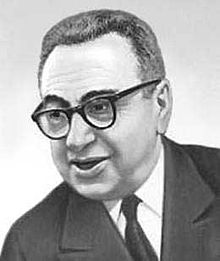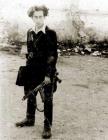ס'ליגט ערגעץ פֿאַרטײַעטס'ליגט ערגעץ פֿאַרטײַעט
דער פֿײַנד, װי אַ חיה
דער מאַוזער ער װאַכט אין מײַן האַנט;צעשניטן
נאָר פלוצעם – געשטאַפאָ!
עס פֿירט אַ געשמידטן
דורך פֿינסטערניש דעם קאָמענדאַנט
די נאַכט האָט מיט בליצן
דאָס געטאָ צעריסן:
געפאַר!, שרײַכ אַ טױער, אַ װאַנט
חברים געטרײַע
פֿון קײטן באַפֿרײַען
פאַרשװינדן מיט דעם קאָמענדאַנט...
די נאַכט איז פֿאַרפֿלױגן
דער טױט – פֿאַר די אױגן
דאָס געטאָ עס פֿיבערט אין בראַנד;
אין אומרו דאָס געטאָ -
עס דראָט די געשטאַפאָ:
טױט, אָדער דעם קאָטענדאַנט.
געזאָעט האָט דאַן איציק
און דורך, װי אַ בליץ איז:
- איך װיל ניט, איר זאָלט צוליב מיר
דאַרפֿן דאָס לעבן
דעם שׂונא אָפגעבן!...
צום טױט גײט שטאָלץ דער קאָמאַנדיר
ליבט װידער פֿאַרטײַעט
דער פֿײַנט, װי אַ חיה
װאַכסט װידער מײַן מאַוזער אין האַנט:
איצט ביסט מיר טײַער
זײַ דו מײַן באַפֿרײַער,
זײַ דו איצטער מײַן קאָמענדאַנט!
דער פֿײַנד, װי אַ חיה
דער מאַוזער ער װאַכט אין מײַן האַנט;צעשניטן
נאָר פלוצעם – געשטאַפאָ!
עס פֿירט אַ געשמידטן
דורך פֿינסטערניש דעם קאָמענדאַנט
די נאַכט האָט מיט בליצן
דאָס געטאָ צעריסן:
געפאַר!, שרײַכ אַ טױער, אַ װאַנט
חברים געטרײַע
פֿון קײטן באַפֿרײַען
פאַרשװינדן מיט דעם קאָמענדאַנט...
די נאַכט איז פֿאַרפֿלױגן
דער טױט – פֿאַר די אױגן
דאָס געטאָ עס פֿיבערט אין בראַנד;
אין אומרו דאָס געטאָ -
עס דראָט די געשטאַפאָ:
טױט, אָדער דעם קאָטענדאַנט.
געזאָעט האָט דאַן איציק
און דורך, װי אַ בליץ איז:
- איך װיל ניט, איר זאָלט צוליב מיר
דאַרפֿן דאָס לעבן
דעם שׂונא אָפגעבן!...
צום טױט גײט שטאָלץ דער קאָמאַנדיר
ליבט װידער פֿאַרטײַעט
דער פֿײַנט, װי אַ חיה
װאַכסט װידער מײַן מאַוזער אין האַנט:
איצט ביסט מיר טײַער
זײַ דו מײַן באַפֿרײַער,
זײַ דו איצטער מײַן קאָמענדאַנט!
Contributed by Alessandro + CCG/AWS Staff - 2009/1/28 - 08:40
Language: Yiddish
La trascrizione del testo in caratteri latini:


Anche la trascrizione è stata confrontata con quella data dalla pagina dello Yad Vashem, che abbiamo emendato solo in piccoli punti per questione di uniformità grafica con gli standard di questo sito. [RV]

Shmerke Kaczerginski.

Matvej Blanter.
Anche la trascrizione è stata confrontata con quella data dalla pagina dello Yad Vashem, che abbiamo emendato solo in piccoli punti per questione di uniformità grafica con gli standard di questo sito. [RV]
YITSIK VITNBERG
S'ligt ergets fartayet
Der faynd, vi a khaye,
Der mauzer er vakht in mayn hant;
Nor plutsem - geshtapo!
Es firt a geshmidtn
Durkh fintsternish dem komendant
Di nakht hot mit blitsn
Dos geto tserisn:
"Gefar!" Shrayt a toyer, a vant
Khaveyrim getraye
Fun keytn bafrayen
Farshvindn mit dem komendant...
Di nakht iz farfloygn
Der toyt- far di oygn
Dos geto es fibert in brand;
In umru dos geto -
Es drot di geshtapo:
"Toyt, oder dem komendant"
Gezogt hot dan Itsik
Un durkh, vi a blits iz:
-"Ikh vil nit, ir zolt tsulib mir
Darfn dos lebn
Dem soyne opgebn!"...
Tsum toyt geyt shtolts der komandir
Ligt vider fartayet
Der faynt, vi a khaye
Vakhst vider mayn mauzer in hant:
"Itst bist mir tayer,
Zay du mayn bafrayer,
Zay du itster mayn komendant!".
S'ligt ergets fartayet
Der faynd, vi a khaye,
Der mauzer er vakht in mayn hant;
Nor plutsem - geshtapo!
Es firt a geshmidtn
Durkh fintsternish dem komendant
Di nakht hot mit blitsn
Dos geto tserisn:
"Gefar!" Shrayt a toyer, a vant
Khaveyrim getraye
Fun keytn bafrayen
Farshvindn mit dem komendant...
Di nakht iz farfloygn
Der toyt- far di oygn
Dos geto es fibert in brand;
In umru dos geto -
Es drot di geshtapo:
"Toyt, oder dem komendant"
Gezogt hot dan Itsik
Un durkh, vi a blits iz:
-"Ikh vil nit, ir zolt tsulib mir
Darfn dos lebn
Dem soyne opgebn!"...
Tsum toyt geyt shtolts der komandir
Ligt vider fartayet
Der faynt, vi a khaye
Vakhst vider mayn mauzer in hant:
"Itst bist mir tayer,
Zay du mayn bafrayer,
Zay du itster mayn komendant!".
Contributed by CCG/AWS Staff - 2013/4/23 - 23:05
Language: English
La versione inglese pubblicata in לידער פֿון די געטאָס און לאַגערן (1948: testo pp. 341-342, musica: p. 426), in מיר זײַנען דאָ (1983, p. 87) con traduzione inglese, in מין המצר קרתי (1954, p. 197) e in מין המצר (1987, p.88) con traduzione ebraica, ed altre antologie. Il testo è ripreso dalla pagina dello Yad Vashem.
The song was published in Lider fun di Getos un Lagern (1948, words – pp. 341-342, melody – p. 426), in Mir Zaynen Do (1983, p. 87) with English translation, in Min Hametsar Karati (1954, p. 197), in Min Hametsar (1987, p. 88) with Hebrew translation, and in other anthologies.
The song was published in Lider fun di Getos un Lagern (1948, words – pp. 341-342, melody – p. 426), in Mir Zaynen Do (1983, p. 87) with English translation, in Min Hametsar Karati (1954, p. 197), in Min Hametsar (1987, p. 88) with Hebrew translation, and in other anthologies.
ITSIK VITENBERG
Somewhere crouching, hiding,
The foe, beastlike, biding,
The mauzer keeps watch in my hand
Suddenly the Gestapo
Leads one whom they've trapped oh!
Through darkness, it's our commandant.
With lightning the night
Tears the ghetto with fright.
There's danger about and fears mount,
Dear friends so devoted,
Chains must be exploded,
And vanish must our commandant.
Night faded, it tore us,
As death stood before us.
The ghetto in fever did pant.
In turmoil the ghetto -
Commands the Gestapo:
It's death or it's your commandant.
Then spoke up our Itsik
As quick as a blink is
“I must heed this edict, that's clear.
I'll not forfeit your lives,
To the tyrants' cruel knives.”
To death he goes without fear.
Again crouching, hiding,
The foe, beastlike, biding,
Again mauzer guards in my hand.
Now you're dear to me,
My savior you must be,
Now you must be my commandant.
Somewhere crouching, hiding,
The foe, beastlike, biding,
The mauzer keeps watch in my hand
Suddenly the Gestapo
Leads one whom they've trapped oh!
Through darkness, it's our commandant.
With lightning the night
Tears the ghetto with fright.
There's danger about and fears mount,
Dear friends so devoted,
Chains must be exploded,
And vanish must our commandant.
Night faded, it tore us,
As death stood before us.
The ghetto in fever did pant.
In turmoil the ghetto -
Commands the Gestapo:
It's death or it's your commandant.
Then spoke up our Itsik
As quick as a blink is
“I must heed this edict, that's clear.
I'll not forfeit your lives,
To the tyrants' cruel knives.”
To death he goes without fear.
Again crouching, hiding,
The foe, beastlike, biding,
Again mauzer guards in my hand.
Now you're dear to me,
My savior you must be,
Now you must be my commandant.
Contributed by Riccardo Venturi - 2013/4/24 - 02:49
Language: English
Ulteriore versione inglese
Alternative English translation
Alternative English translation
YITZHAK WITENBERG
Somewhere the enemy
Lies hidden like a beast
The Mauser in my hand is alert
But suddenly - the Gestapo -
Leading our Commandant in chains
Through the darkness
Night in the Ghetto
Was torn by lightning
"Beware!" shrieks a buidling, a wall
Faithful comrades
Freed from chains
Vanished with the Commandant
Night has flown by
Death hovered before us
The Ghetto is shaken as with fever"
Restless the Ghetto
As Gestapo threatens:
"Your commandant, or Death!"
Itzik then spoke up -
Words that struck like lightning
"I do not want that because of me
Your lives are to be put
in the hands of the foe..."
Proudly to his death went our Commandant!
Again, somewhere the enemy
Lurks like a beast;
The Mauser is alert in my hand
No, my Mauser,
Be you the liberator
Be you my Commandant now.
Somewhere the enemy
Lies hidden like a beast
The Mauser in my hand is alert
But suddenly - the Gestapo -
Leading our Commandant in chains
Through the darkness
Night in the Ghetto
Was torn by lightning
"Beware!" shrieks a buidling, a wall
Faithful comrades
Freed from chains
Vanished with the Commandant
Night has flown by
Death hovered before us
The Ghetto is shaken as with fever"
Restless the Ghetto
As Gestapo threatens:
"Your commandant, or Death!"
Itzik then spoke up -
Words that struck like lightning
"I do not want that because of me
Your lives are to be put
in the hands of the foe..."
Proudly to his death went our Commandant!
Again, somewhere the enemy
Lurks like a beast;
The Mauser is alert in my hand
No, my Mauser,
Be you the liberator
Be you my Commandant now.
Contributed by Alessandro - 2009/1/28 - 08:42
Il Ghetto è quello di Vilna (Vilnius), in Lituania...
"Yitzhak Wittenberg (1907-1943) nacque da una famiglia operaia e fu sarto. Sin da giovanissimo aderì al partito comunista. Durante l'occupazione sovietica della Lituania si fece conoscere come attivista comunista. Durante l'occupazione tedesca di Vilna divenne capo del nucleo di resistenza comunista.
Fu contemporaneamente il primo capo della organizzazione di resistenza ebraica all'interno del ghetto la FPO (Fareinigte Partizaner Organizacje) che riuniva sia gli elementi comunisti che anticomunisti del ghetto.
Nel gennaio 1942 venne eletto comandante della FPO per la sua esperienza organizzativa, i suoi legami con i nuclei partigiani esterni e la sua capacità militare.
Quando un appartenente alla cellula comunista di Vilna venne arrestato, i tedeschi vennero a sapere che Wittenberg era uno degli attivisti. Pur ignorando il suo ruolo anche nell'FPO i tedeschi chiesero che Wittenberg venisse consegnato alla Gestapo.
Jacob Gens, il capo della polizia ebraica nel Ghetto, era intenzionato a consegnare Wittenberg ed ebbe un duro scontro con l'FPO. Wittenberg venne arrestato dalla polizia lituana. Ma con una azione armata dell'FPO capitanata da Abba Kovner venne liberato e nascosto nuovamente nel ghetto.
L'incidente tra Wittenberg e Gens rischiava di trasformarsi in scontro aperto tra la polizia del ghetto e l'FPO.
Gens si appellò alla popolazione accusando l'FPO di irresponsabilità. La maggior parte della comunità si schierò con Gens.
L'atteggiamento ostile della gente e la convinzione che i tempi non erano ancora maturi per una rivolta generale convinse l'FPO della necessità di consegnare Wittenberg alla polizia di Gens.
Wittenberg, nominò suo successore al comando della FPO Abba Kovner e si consegnò spontaneamente il 16 luglio 1943. Per non cadere nelle mani dei tedeschi sembra che Witenberg si sia suicidato ingerendo del veleno."
"Yitzhak Wittenberg (1907-1943) nacque da una famiglia operaia e fu sarto. Sin da giovanissimo aderì al partito comunista. Durante l'occupazione sovietica della Lituania si fece conoscere come attivista comunista. Durante l'occupazione tedesca di Vilna divenne capo del nucleo di resistenza comunista.
Fu contemporaneamente il primo capo della organizzazione di resistenza ebraica all'interno del ghetto la FPO (Fareinigte Partizaner Organizacje) che riuniva sia gli elementi comunisti che anticomunisti del ghetto.
Nel gennaio 1942 venne eletto comandante della FPO per la sua esperienza organizzativa, i suoi legami con i nuclei partigiani esterni e la sua capacità militare.
Quando un appartenente alla cellula comunista di Vilna venne arrestato, i tedeschi vennero a sapere che Wittenberg era uno degli attivisti. Pur ignorando il suo ruolo anche nell'FPO i tedeschi chiesero che Wittenberg venisse consegnato alla Gestapo.
Jacob Gens, il capo della polizia ebraica nel Ghetto, era intenzionato a consegnare Wittenberg ed ebbe un duro scontro con l'FPO. Wittenberg venne arrestato dalla polizia lituana. Ma con una azione armata dell'FPO capitanata da Abba Kovner venne liberato e nascosto nuovamente nel ghetto.
L'incidente tra Wittenberg e Gens rischiava di trasformarsi in scontro aperto tra la polizia del ghetto e l'FPO.
Gens si appellò alla popolazione accusando l'FPO di irresponsabilità. La maggior parte della comunità si schierò con Gens.
L'atteggiamento ostile della gente e la convinzione che i tempi non erano ancora maturi per una rivolta generale convinse l'FPO della necessità di consegnare Wittenberg alla polizia di Gens.
Wittenberg, nominò suo successore al comando della FPO Abba Kovner e si consegnò spontaneamente il 16 luglio 1943. Per non cadere nelle mani dei tedeschi sembra che Witenberg si sia suicidato ingerendo del veleno."
Alessandro - 2009/1/28 - 14:45
Molto interessante anche la biografia di Jacob Gens, che nel ghetto di Vilna era il capo della polizia ebraica "collaborazionista" e fu il grande antagonista della resistenza del FPO di Wittenberg...
Gens era convinto che bisognasse collaborare con i tedeschi per salvare il ghetto e i suoi abitanti più giovani e forti... A tale scopo, la polizia di Gens non esitò a consegnare essa stessa ai nazisti gli ebrei da terminare... Inoltre, come si è detto, Gens impedì di fatto il successo della rivolta nel ghetto, organizzata dai militanti della resistenza...
Ma quando nell'estate del 1943 fu chiaro a tutti che i nazisti avrebbero comunque spazzato via il ghetto, Gens, che sapeva che i nazisti volevano farlo fuori e che pure avrebbe potuto mettersi in salvo, il 14 settembre del 1943 si recò spontaneamente al quartier generale della Gestapo a Vilna e lì, in mezzo al cortile, venne trucidato...
Quasi una nemesi per la morte del suo compagno/avversario Yitzhak Wittenberg...
Gens era convinto che bisognasse collaborare con i tedeschi per salvare il ghetto e i suoi abitanti più giovani e forti... A tale scopo, la polizia di Gens non esitò a consegnare essa stessa ai nazisti gli ebrei da terminare... Inoltre, come si è detto, Gens impedì di fatto il successo della rivolta nel ghetto, organizzata dai militanti della resistenza...
Ma quando nell'estate del 1943 fu chiaro a tutti che i nazisti avrebbero comunque spazzato via il ghetto, Gens, che sapeva che i nazisti volevano farlo fuori e che pure avrebbe potuto mettersi in salvo, il 14 settembre del 1943 si recò spontaneamente al quartier generale della Gestapo a Vilna e lì, in mezzo al cortile, venne trucidato...
Quasi una nemesi per la morte del suo compagno/avversario Yitzhak Wittenberg...
Alessandro - 2009/1/28 - 15:11
Ogni volta che riprendo la "sezione Yiddish" in mano, mi vengono letteralmente i bordoni. Sia, ovviamente, per la bellezza e per la generale tragicità di molte di queste canzoni, nate nei ghetti e nelle rivolte contro i nazisti; sia per il lavoro che c'è da fare su ognuna di queste pagine per sistemarle ammodino. Vorrei a tale riguardo fare una raccomandazione a chiunque (Alessandro ed altri) ricerca e inserisce usualmente canzoni in lingua yiddish: poiché presentano numerosi e difficili problemi testuali (derivanti dalla pressoché generale e pessima abitudine che i siti hanno di riportare i testi soltanto in trascrizione latina), prima di inserire una canzone in yiddish contattatemi personalmente. Oltretutto, i testi "trascritti" sono quasi sempre imprecisi (naturalmente non per colpa di chi li inserisce qui). Mi raccomando. So di essere spaventosamente rompiscatole, ma l'esattezza testuale assoluta è un dogma di questo sito, ed anche ciò che lo rende diverso da tutti gli altri. Grazie.
Riccardo Venturi - 2013/4/24 - 00:57
×
![]()
Note for non-Italian users: Sorry, though the interface of this website is translated into English, most commentaries and biographies are in Italian and/or in other languages like French, German, Spanish, Russian etc.








[1946]
Testo di Shmerke Kaczerginski
Musica originale di Matvej Isaakovič Blanter
Lyrics by Shmerke Kaczerginski
Original (Russian) music by Matvej Isaakovič Blanter
La canzone fu scritta da Kaczerginsky, poeta e partigiano ebreo, dopo la fallita rivolta del Ghetto nel settembre 1943 e racconta della resa del comandante partigiano Yitzhak Wittenberg alla Gestapo nazista, che ne aveva chiesto la consegna minacciando la distruzione del Ghetto. Infatti, le continue "aktionen" degli occupanti ai danni degli abitanti del Ghetto, avevano posto la Judenrat, la dirigenza ebraica, in contrasto con la resistenza organizzata nella "Fareynikte Partizaner Organizatsye" (FPO). I partigiani ebrei lasciarono quindi il Ghetto per unirsi alle altre forze della resistenza, ma ciò naturalmente non impedì ai nazisti di liquidarlo alla fine dello stesso 1943.
Si nasconde come un animale,
La Mauser carica nella mia mano,
all’improvviso la Gestapo
conduce nel buio della notte
un prigioniero: il comandante!...
…Fiero il comandante va verso la morte!
Restiamo ancora nascosti
Il nemico come un animale,
ancora la pistola carica nella mia mano…"
Come nel caso di molte canzoni in lingua yiddish presenti in questo sito, il testo (scritto da Kaczerginski nel 1946 sull'aria di una canzone russa musicata da Matvej Blanter) è stato originariamente inserito esclusivamente nella trascrizione in caratteri latini. Si tratta di una pratica assurda e totalmente irrispettosa della lingua yiddish, che questo sito tenta di eliminare ricercando in rete, o restaurando attentamente, i testi nei caratteri ebraici. In questo caso entrambe le cose: il testo originale è stato prima ricostruito e poi confrontato con la versione data dalla pagina dello Yad Vashem. Un file audio della versione originale cantata da Shmerke Kaczerginski stesso è presente in "Heartstrings - Music of the Holocaust". Così quest'ultimo sito introduce la canzone:
This performance of the song, from a recording for the Central Jewish Historical Commission, Munich, 1946, is by Shmerke Kaczerginski, who sings all five verses and repeats the second part of each verse.
The song was published in Lider fun di Getos un Lagern (1948, words – pp. 341-342, melody – p. 426), in Mir Zaynen Do (1983, p. 87) with English translation, in Min Hametsar Karati (1954, p. 197), in Min Hametsar (1987, p. 88) with Hebrew translation, and in other anthologies.
The title of the song is its subject, Itsik Vitnberg. The song tells of the tragic story of Vitnberg, whose death caused the Vilna partisans to leave the city for the forests to forestall the liquidation of the ghetto by the Nazis.
In a note on the song, Kaczerginski writes: “On the night of 16 July 1943, the Gestapo arrested the commander of the Vilna partisans, Itsik Vitnberg. Some partisans managed to break into his prison cell and freed him. The next day the Gestapo threatened the liquidation of the entire ghetto population if Vitnberg did not surrender. Though he knew that the ghetto would be destroyed whether he gave himself up or not, and that the Gestapo was just using him as an excuse, he turned himself in to avoid hostility between the ghetto residents and the Vilna partisans. Two days later, he was murdered.”
The song, like other Vilna ghetto and partisans songs, describes the incident and humanizes the surrounding nature, nighttime. The dark of night helps the partisans fight and free Vitnberg, until he surrenders his life for the sake of everyone else. The melody is taken from a popular Russian song. [RV]